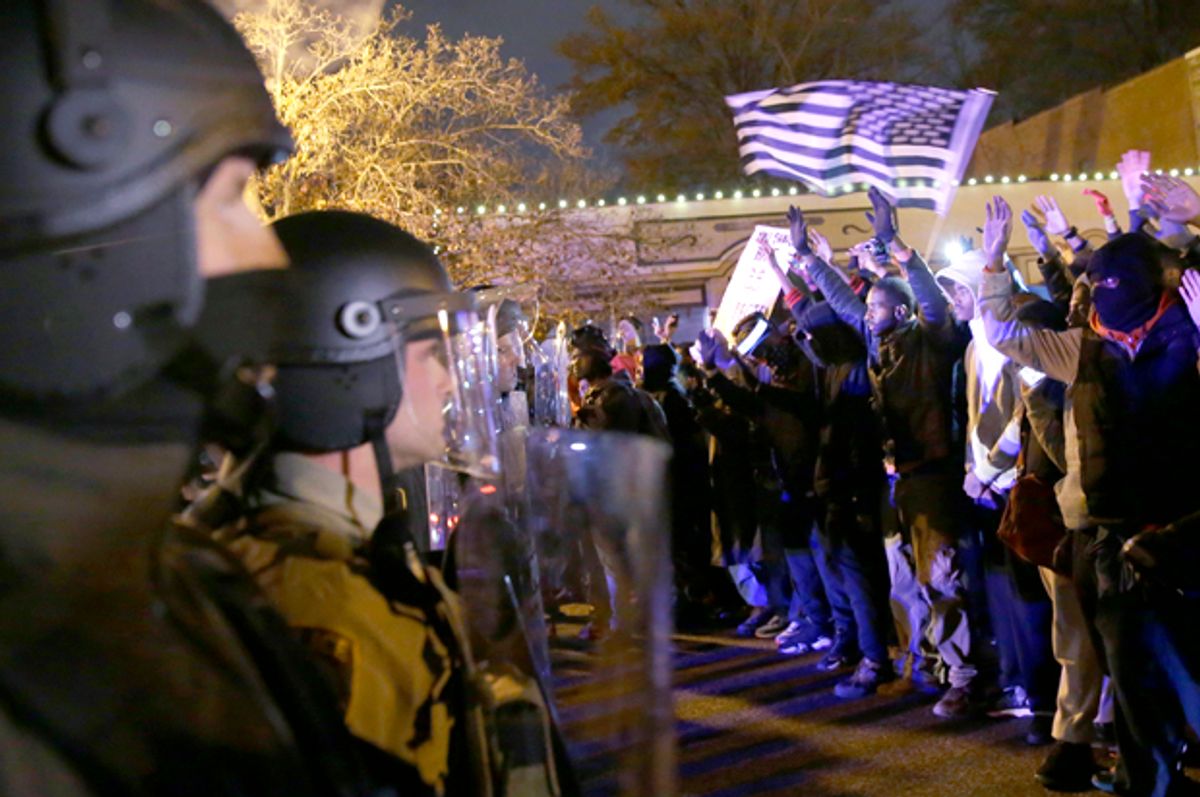Again. Just more than a week after a grand jury in Ferguson, Missouri, opted not to indict officer Darren Wilson in the August shooting death of unarmed African-American teen Michael Brown, another grand jury on Wednesday decided to bring no charges against a white New York City police officer who put the unarmed African-American man Eric Garner in a chokehold, leading to Garner's death. As with Ferguson, the decision in New York sparked nationwide protests last week, with demonstrators taking to the streets demanding to know when the madness will stop, when those whose purported job is to protect will be held accountable for treating black bodies as inherently suspect, menacing and disposable.
The outrage generated by Brown's killing on Ferguson's Canfield Drive, Garner's death outside a Staten Island bodega, and the subsequent decisions to move right along is crystallizing into something more than mere protests, however. The demonstrations, while galvanizing and important, represent something larger: a movement. It's a movement against police brutality, for the dignity of black lives, against institutional racism, and for social justice. These grievances and demands are hardly new; the harsh realities of the black experience are news only to those who haven't paid attention to American history. But while their struggle is a long-running one, the demonstrators are at the forefront of a cause that has spawned newfound attention and a profound sense of urgency.
As protesters across the country massed in response to the New York grand jury decision, low-wage workers in more than 150 cities walked out of the job in a one-day strike on Thursday, with fast food workers and many home care aides and convenience store clerks calling for higher pay as part of the Fight for 15 campaign, which is organizing workers for a $15 an hour wage and union rights.
“I have never seen a movement like this,” Terrance Wise, the charismatic face of the movement, told the New York Times' Steven Greenhouse. “We’ve seen how the civil rights movement won civil rights and we’ve seen how women won the right to vote. Those things weren’t given to us. People faced hoses and beatings."
“Some people even died. We have to bring the same pressure for today’s times and make the companies listen to us. We have to do whatever it takes to win," Wise added.
The movement spurred by Staten Island/Ferguson and the Fight for 15 may appear to be fundamentally different causes, but as Wise's comments suggest, they stem from a common concern. Undergirding the struggles for racial justice and economic justice is a deeply felt hunger for social justice, for a society that no longer marginalizes the black, the brown and the economically vulnerable -- groups with significant overlap.
"People of color can't depend on fair wages or fair justice in this country," Dan Cantor, national director of the Working Families Party, said in a statement on Thursday. "Today, protests against police violence are mingling with the fast food workers' fight for $15 and a union. The common issue is that black and brown lives still count for less in America. That has to change."
The marriage of the campaigns for racial and economic justice dates to the civil rights movement. As Sarah Jaffe noted in Salon on Friday, an assassin's bullet claimed Martin Luther King Jr. when he was in Memphis to support striking sanitation workers; King's death came just months after he launched his Poor People's Campaign, recognizing that a more equitable economic system was indispensable to improving African-Americans' lives and that hopes for a more egalitarian society created the potential for a multiracial coalition.
"Negroes," King said in 1967, "are not the only poor in the nation. There are nearly twice as many white poor as Negro, and therefore the struggle against poverty is not involved solely with color or racial discrimination but with elementary economic justice."
Combatting poverty, as King stressed, was and is a concern that touches members of all races and ethnicities. But he also recognized -- and spent much of his career highlighting -- how the forces of economic oppression and inequality disproportionately harmed black people and other racial minorities. Racial apartheid forced blacks into segregated neighborhoods cut off from social and economic networks, pushing African-Americans further into the socioeconomic margins, with consequences that continue to be felt today -- particularly in places like Ferguson. The population of Michael Brown's hometown is two-thirds African-American and people earn a median income of just $21,000 a year. Ferguson seems a world away from the affluent, 78 percent white county seat of Clayton, where residents earn a median annual income of nearly $90,000.
Last week's protests reminded us of the gross injustices that continue to wreak havoc on the lives of America's oppressed. When people lack the right to live free of wanton police abuse, when they earn wages that don't come remotely close to allowing them one iota of economic security, their dignity and basic humanity are under assault. This is the message that popular activists aim to bring home. Is America listening?

Shares